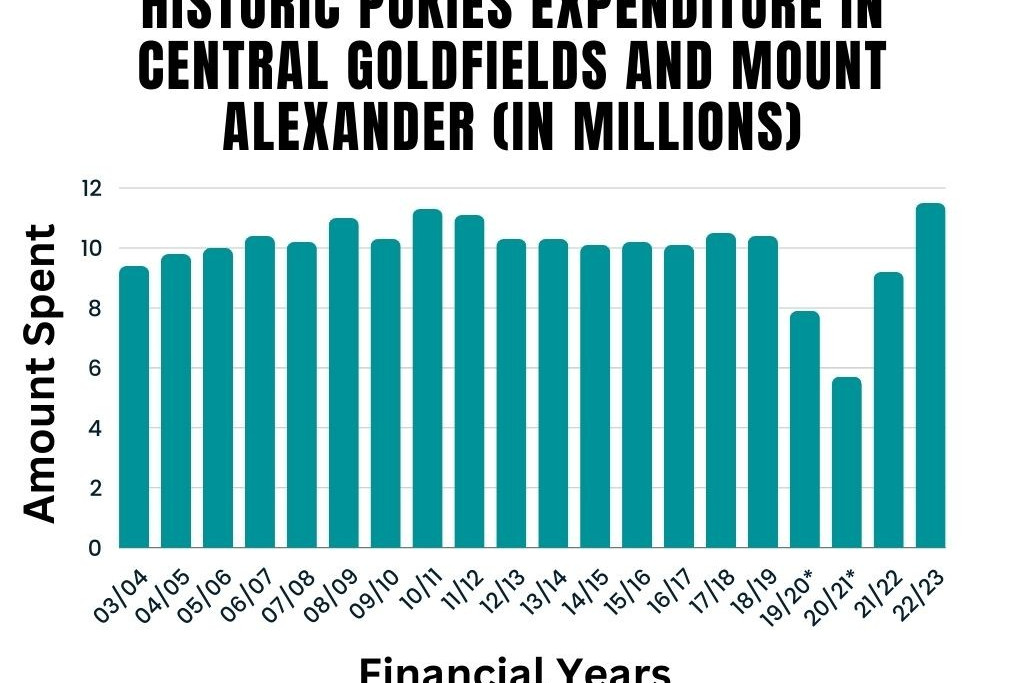General News
11 March, 2024
Residents continue to lose big at local gambling establishments, data finds
Data from the Victorian Gambling and Casino Control Commission (VGCCC) has found locals have suffered from its highest pokies losses on record in the 2022/23 financial year, losing an average of over $31,000 a day. Pokies players in Shire of Central...

Data from the Victorian Gambling and Casino Control Commission (VGCCC) has found locals have suffered from its highest pokies losses on record in the 2022/23 financial year, losing an average of over $31,000 a day.
Pokies players in Shire of Central Goldfields, which includes the Shire of Mount Alexander, lost over $11.5 million on pokie machines across three venues, a nearly 26 percent increase from the $9.2 million lost in the previous financial year.
The Maryborough Highland Society also recorded its highest losses on record in the last financial year of nearly $6.5 million, despite not adding any more pokie machines in the past decade.
The VGCCC has recorded pokie losses in the community since 2000, and found the region has lost nearly $100 million over the last 10 financial years.
Victorian Responsible Gambling Foundation (VRGF) principal clinical advisor Tony Clarkson said the design of the machines are made to get gamblers hooked, even while losing money.
“My biggest concern would be we know that people who gamble on the pokies tend to lose more money than people who gamble on other gambling products,” he said.
“There is actually less people year-on-year who gamble on pokies, but the amount of money being lost is steadily increasing.
“The technical design of pokies through the visual and auditory experience is intended to keep the gambler at the machine.
“For example, you can spin the pokie machine and put $50 in and you could hear all pleasant noises and bright lights that say you’ve won $12, when you have lost $38.
“If you think about where pokies are situated, there are no windows, there are no clocks, and often in pubs and clubs there is no one else there so it’s very secretive.”
Healthdirect states the consequences of gambling addiction include financial harm, social isolation, mental health issues and other addictions like alcohol.
Mr Clarkson said gambling addictions can take a toll on the local community.
“We have estimated that the social cost of gambling to the Victorian community is $7 billion a year,” he said.
“People who come to support services because of gambling often have a story that is similar to others where they have been introduced to gambling by a family member or a friend, and the first time there was a large win they were hooked.
“We often hear from gamblers about how they have lost a house, they have divorced from their spouse, they have lost family and in more extreme cases, experienced suicidal thoughts or attempts.”
The VRGF has found gambling addiction is a chronically relapsing condition, meaning gamblers who have developed an addicting habit are more likely to relapse.
“A lot of it relates to brain chemicals like dopamine that are released when somebody experiences addiction,” Mr Clarkson said.
“The dopamine that’s released in the brain and gives you the rush often happens just before the actual activity, often it comes from thinking about it, planning it and then just before you execute it.
“What we often do is try to educate people at the very start of the treatment that [a relapse] could happen, and there are some things you can put in place when it does happen.
“For example communicating with a family member, nominating somebody you can speak to when something does happen, leaving bank cards at home or giving them to someone else.”
While it can be a long and difficult road to recovery, Mr Clarkson said friends and family can play a key role in supporting recovering gamblers.
“The most important thing is to talk about it — gambling has become very standardised in Australia, there is that sense of if you’re not winning you are not doing it right,” he said.
“The way to break that down is to talk about it, for people to have open conversations.
“The more we talk about these things, much the same way as we have started to talk a lot more about mental health issues, is trying to normalise those things and get people to understand it’s not something that needs to be stigmatised.”
If you or someone close is struggling with gambling, contact Gambling Help Online’s 24/7 free helpline on 1800 358 358, go to ReachOut.com or contact Lifeline on 13 11 14.